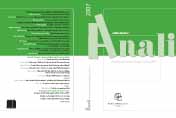Hannah Arendt i poratna Njemačka
Hannah Arendt and Post-War Germany
Author(s): Gilbert MerlioSubject(s): Politics / Political Sciences
Published by: Hrvatsko politološko društvo
Keywords: Hannah Arendt; Karl Jaspers; Jews; National-Socialism
Summary/Abstract: Using the correspondence between Hannah Arendt and Karl Jaspers, the author examines the depth of the gap that arose between Germans and Jews in post-war Germany because of its experience with National-Socialism. The text demonstrates how Hannah Arendt, as a Jew, for whom Germany meant a language, philosophy and poetry, refused to accept Germany’s political destiny and to identify with it. The author highlights Arendt’s view that, for a Jew, to declare oneself a German would mean assuming joint political responsibility for Germany. In the first section of the paper, the author examines the correspondence concerned with the issue of German guilt and the historical breakdown caused by the National-Socialist government. The paper points to her view that total mobilisation ended up as total complicity, where the entire German nation was put in the service of “bureaucratic mass murder”, and to her critique against the Federal Republic of Germany as a polity, whose regime erased any distinction between the guilty and the innocent so effectively that it became impossible to tell if someone was a veiled hero or a former mass murderer. Only when the Nazis hanged someone could we tell that he or she was, in fact, their opponent. The second section of the paper cites Arendt’s views on the Federal Republic of Germany as a political entity, emphasizing her scepticism over the possibility of survival of this polity.
Journal: Anali hrvatskog politološkog društva
- Issue Year: 2007
- Issue No: 04
- Page Range: 251-264
- Page Count: 14
- Language: Croatian

